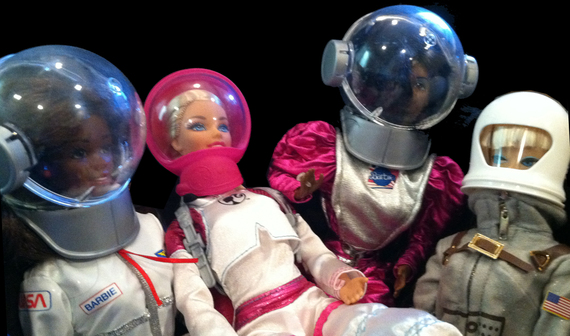When he took charge of the U.S. space program in 2005, former NASA administrator Michael Griffin's stated priority was to get us beyond Earth orbit, but he's built his post-NASA career around delivering scathing assessments of its lack of progress.
Many in the space community agree.
"My biggest disappointment has been that we have not put people on Mars," says planetary scientist Carol Stoker of NASA Ames.
In 1972, the year we last visited the moon, there were plans and proposals that would have redirected the Apollo money toward our next logical goal -- the next world we'd visit, but we didn't go then and we still haven't.
"Mars is there, waiting to be reached," Buzz Aldrin is often quoted as saying. We've been waiting now for more than four decades.
My position is that we needed this break between Apollo program and current missions to send humans to Mars, for three big reasons.
The right stuff for landing on the moon is exactly the wrong stuff for reaching Mars.
Early space missions pursued a singular goal -- to win the space race. It was a brief, intense and highly focused effort -- and there was an end to it. Nobody stayed on the moon.
Mars represents a space program of another kind. The fresh-faced test pilots recruited as Mercury, Gemini and Apollo astronauts were full of bravado and their heroic space exploits have become legendary. On Mars, heroism will be demanded for sure, but the activities of the next wave of astronauts will be less glamorous -- building, farming, maintenance, engineering as ways to stay alive, not until they can climb on board the return spaceship, but for the duration. On this hero's journey, planting seeds and cultivating seedlings will be far more important than planting a flag.
But there's an even bigger reason we needed the long pause.
In 1972, we weren't ready as a species to go.
Women on Earth were years away from gender equity. In 1972 nascent feminists were just beginning to point out the injustices and publicly insist that women were capable of doing much more than they were allowed to do by a society that still believed a woman's primary role should be as wife and mother.
Donna Shirley, who headed the team that built the first Mars rover and eventually ran NASA's entire Mars program, writes in her Managing Martians memoir that after returning from her maternity leave in 1977, she had a hard time getting another good assignment because "JPL now assumed I was 'fulfilled as a mother' and didn't want a 'real job.'"
In 1972 newspaper classified ads still separated listings into "help wanted: male" and "help wanted: female," and the opportunities listed for women were overwhelmingly the established and ingrained women's jobs: teaching, nursing, office work -- all presumed secondary to a husband's career. Smart girls were not encouraged to become scientists, but expected to become schoolteachers -- the question these girls were asked was not "what do you want to be when you grow up?" but "what grade do you want to teach?"
The same year the Apollo program ended, signaling America's decline as a spacefaring nation, the women's movement was on the rise, and this country enacted signature legislation: Title IX, a law prohibiting discrimination against girls and women in public education, not only in athletic programs, but also the science and tech courses in which girls were routinely underrepresented. Title IX represented the first resolute steps for girls with in an interest in pursuing what we now call the STEM disciplines: science, tech, engineering and math.
Which brings us to the third reason we needed to wait.
What we needed was not just time to get our heads around the idea of "womanned" space missions; we also needed time for women to ramp up.
Women couldn't just jump from the kitchen or secretarial pool into a computer lab or spaceship. They needed time to earn advanced degrees, to gain vital professional experience, to prove themselves worthy to an incrementally changing world. Some of these women, I should point out, were simultaneously raising children, managing a home and nurturing a partner who still had not gotten the message about gender equality.
All of these are good reasons for giving pause: to reflect, to reorient ourselves to a mission that is radically different in so many ways, to reboot space exploration plans worldwide in a way that reflects the more inclusive goal of sending humans who fully represent our species to colonize another planet. Mars needs women and men.
"Wait for it" originated in the British Army during WW2 when soldiers were cautioned that a disastrous event was sure to result if they didn't obey the commander's orders; the phrase has now morphed into a sitcom staple used to build suspense just before the punch line is delivered.
The anticipation has been building for decades in our efforts to send humans to Mars, and the payoff, when it arrives, will redefine the phrase once more. When humans take their next step into space, they will be taking the next step in human evolution, and their efforts will invigorate a human space exploration program that has been languishing while we've all been waiting.
